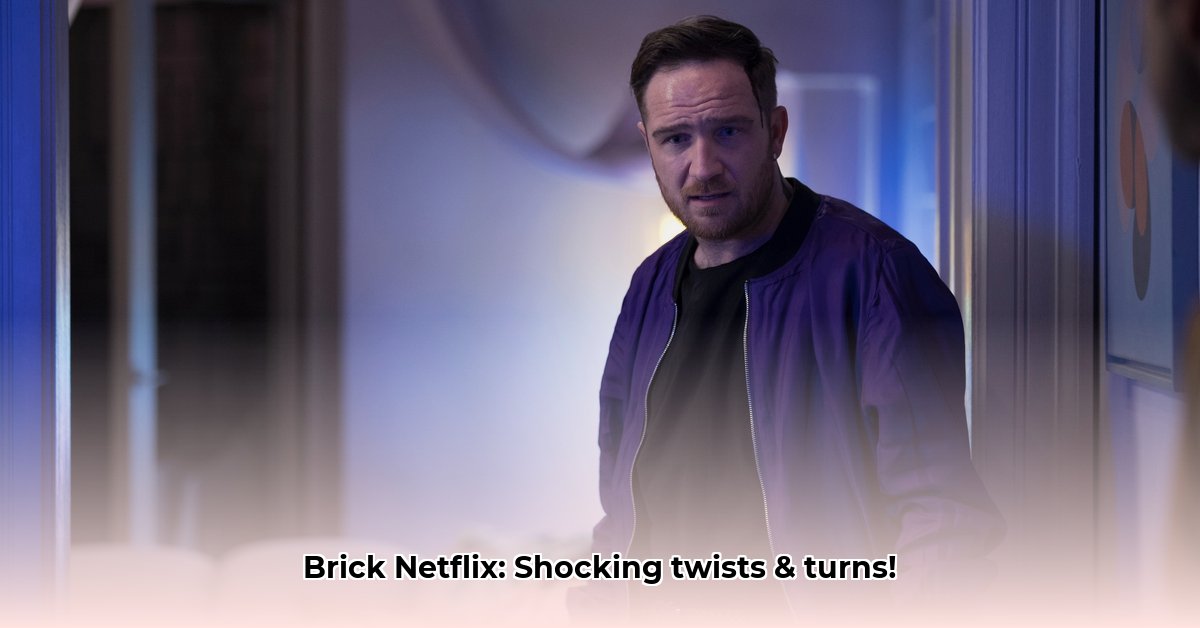
Trapped in a Brick Wall, But Not in a Rut
Right, so Netflix dropped Brick, and it’s not your average alien-invasion extravaganza. This German import is a slow-burn thriller about a creepy apartment building and its trapped inhabitants. The acting is seriously top-notch, especially from the German cast – Matthias Schweighöfer, Ruby O. Fee, and Frederick Lau – who really sell the suspense. This review will unpack their performances, Brick's place within the sci-fi thriller genre, and whether it's worth your time.
More Than Just Bricks and Mortar: The Cast's Stellar Performance
The film's success rests on its actors' shoulders. Schweighöfer, Fee, and Lau aren't just pretty faces; they bring depth to their roles. Schweighöfer embodies Tim, thrust into reluctant leadership. His portrayal is surprisingly relatable, even amidst chaos. Ruby O. Fee, as the ever-skeptical Yuri, provides a perfect counterpoint to Tim's earnest attempts at maintaining calm. And Frederick Lau as Marvin? He’s the escalating source of tension for everyone else.
Each actor contributes a unique energy, creating a compelling dynamic. Their performances are so strong, they elevate the familiar plot points far beyond typical genre fare. The casting choices are particularly smart considering their existing fanbase in Germany. This familiarity enhances viewer investment in their fates, adding an unexpected layer of emotional depth. Isn't that clever casting, eh?
Familiar Formula, Fresh Faces: The Sci-Fi Thriller Genre
Brick uses familiar genre conventions: the classic "what the heck is going on?" moment, the diverse trapped group, and the slow build of suspense. But the film transcends these tropes through its masterful execution. The cast's performances inject a unique flavour, transforming familiar plot points into something fresh and compelling. Their subtle nuances amplify the tension, making the experience genuinely gripping.
Beyond the Wall: A German Perspective
The film's German origins are key. Casting well-known German actors was a strategic masterstroke. It not only benefits from their existing fanbase but also imbues the film with a distinct cultural identity. This offers a refreshing change from the typical Hollywood fare. It’s not just a generic thriller; it’s got a unique cultural flavour.
What Worked, What Didn't: A Balanced Look
Brick isn’t reinventing the wheel, but it's well-executed.
Strengths:
- Powerful Performances: The cast is excellent, delivering believable emotion and subtle tension.
- Atmosphere: The film creates a brilliantly claustrophobic atmosphere; you feel the pressure, the rising anxiety within those walls.
- Genre Playbook Done Right: It efficiently uses familiar thriller elements without sacrificing effectiveness.
Weaknesses:
- Predictability: The plot may feel familiar to seasoned thriller viewers. The mystery is compelling, but not groundbreaking.
- Unresolved Mysteries: The "why" behind the wall remains somewhat ambiguous, which might leave some viewers wanting.
The Verdict: Worth a Watch
Brick isn't a cinematic masterpiece, but it's a highly enjoyable thriller. The strong acting and atmosphere compensate for a somewhat predictable plot. Fans of character-driven suspense should definitely check it out. It's a testament to how great acting and atmosphere elevate a familiar story. Don't expect mind-blowing twists, but do expect a gripping and well-acted thriller offering a unique cultural perspective.
How to understand Brick's German Sci-Fi Thriller Narrative Structure
Key Takeaways:
- Brick's trapped-apartment setting immediately establishes high stakes.
- Schweighöfer, Fee, and Lau's performances drive the film's suspense.
- The film masterfully blends external and internal conflicts.
- Brick effectively uses familiar tropes while offering a unique perspective.
- The ending leaves viewers with lingering questions, deepening the impact.
Netflix's Brick, a German sci-fi thriller, is more than just another dystopian drama. It cleverly explores themes of technology, relationships, and loss, all while maintaining suspense. Let's unpack this film's narrative structure.
The Claustrophobic Setting: A Stage for Drama
The film cleverly uses its setting—a high-rise apartment block sealed off by a mysterious, unexplained brick wall—as a character itself. The confinement amplifies the tension, turning the building into a microcosm of societal collapse mirroring the characters' relationships. It’s a pressure cooker raising the stakes with every interaction.
Character Dynamics: A Thrilling Dance
Schweighöfer and Fee deliver powerful performances as the central couple. Their emotional journey mirrors the external threats, highlighting their pre-existing relationship issues. Their chemistry—or lack thereof—is pivotal in creating tension. Their unspoken anxieties and desperation resonate deeply. Lau's character acts as a fascinating foil, adding another layer of intrigue.
Genre Conventions and Unique Twists: A Familiar Recipe, A Unique Flavor
Brick employs familiar sci-fi thriller tropes, but its strength lies in its execution. While not revolutionary in plot, it offers a fresh perspective. The characters aren't just victims; their choices and relationships shape the narrative. The integration of themes like grief adds emotional weight, blending seamlessly with external conflicts.
The Ending: A Lingering Sense of Dread
Brick's conclusion resolves the immediate crisis, yet leaves a lingering unease. This clever technique compels viewers to grapple with the larger narrative’s implications, prompting questions about the future and unchecked technological advancement. It’s a satisfying conclusion that stays with you.